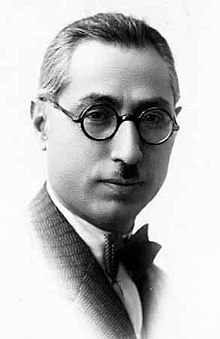Jamil Mardam Bey
| Jamil Mardam Bey جميل مردم بك |
|
|---|---|
 |
|
| Prime Minister | |
|
In office December 21, 1936 – February 18, 1939 |
|
| Preceded by | Ata Bay al-Ayyubi |
| Succeeded by | Lutfi al-Haffar |
|
In office December 29, 1946 – December 17, 1948 |
|
| Preceded by | Khalid al-Azm |
| Succeeded by | Khalid al-Azm |
| Personal details | |
| Born | 1894 Damascus, Ottoman Syria |
| Died | March 30, 1960 Cairo, Egypt |
| Political party | National Bloc |
| Spouse(s) | Safwat Sami Pasha Mardam Bey |
| Religion | Sunni Islam |
Jamil Mardam Bey (Arabic: جميل مردم بك Turkish: Cemil Mardam Bey; 1894–1960), was a Syrian politician. He was born in Damascus to a prominent aristocratic Sunni Muslim family. He is descended from Ottoman's general, statesman and Grand Vizier Lala Mustafa Pasha. He studied at the school of Political Science in Paris and was a founder of Al-Fatat, the leading opposition party in Ottoman Syria.
Mardam Bey was born in Damascus in 1893 to one of the most prominent Syrian families of Turkish ancestry.
Al-Fatat was founded by five Arab students living in Paris in 1911. The organization called on Arab and Turkish citizens to remain united within the Ottoman framework, but claimed that the Arabs should have equal rights and obligations as their Ottoman counterparts. In 1913, Al-Fatat moved its offices to Beirut. In 1914, its founders opened an office in Damascus to coordinate nationalist activity.
In the summer of 1913, the Al-Fatat founders called for the Arab Congress of 1913 in Paris to discuss the deteriorating living standards in the Ottoman Empire. Not wishing to create a permanent break up with authorities in Constantinople, the founders did not call for complete Arab liberation, but tried to sort out its relations with the Ottomans. When that failed, they publicly headed the separatist movement demanding a complete break with the Ottomans.
In 1916, Jamil Mardam Bey joined the Arab revolt of Sharif Hussein ibn Ali, a military uprising demanding full independence for the Arab provinces in the Ottoman Empire. The Ottomans sentenced him to death in absentia and he fled to Europe where he coordinated nationalists activity between the politicians in exile and the underground in Syria. His comrades were hanged in public in Damascus and Beirut on May 6, 1916.
...
Wikipedia
